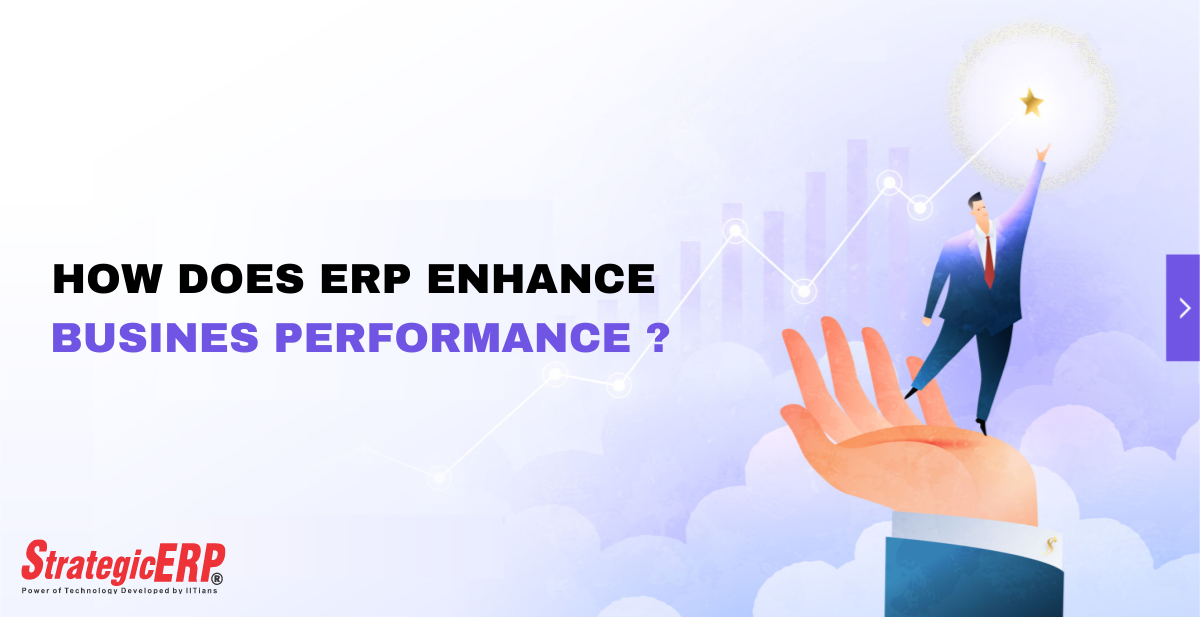How does ERP enhance Business Performance?
Category : ERP
Blog posted by : Admin / 23 Sep, 2020
More and more businesses in the 21st century have started realising the importance of robust IT solutions. ERP systems have been getting their rightful recognition in the business world for their crucial role. Even so, it seems that a large part of the business world recognises ERP solutions only as a necessity for operations, and nothing more than that. Today, we would like to share with you some information on how ERP systems help in enhancing business performance.
Most businesses are aware of the fact that ERP software are developed to help them achieve operational excellence. However, the role of ERP does not stop there. Today's ERP software can do much more than that. Technology has too much to offer in today's world that can help businesses tremendously. Technologies like Artificial Intelligence, Big Data, Information Analytics, IoT (Internet of Things), RPA (Robotic Process Automation), and Cloud Computing have tremendous value for the ERP realm that will not only improve operational efficiency but also enhance business performance.
So the question is - How exactly does ERP enhance business performance? This is the question we will be answering today.
Business Process Automation
Any modern and advanced ERP solution is well-endowed with Automation capabilities. Automation does much more than just speed up operations. Automation has too many benefits that make it one of the leading revolutionary technologies. By automating most daily operations and menial tasks, considerable time and labour are saved, which can be used in more productive tasks and tasks that require skilled labour. Additionally, reducing human involvement in such tasks also reduces human error. Computers and machines will also take less time than humans in finishing tasks, thus further increasing efficiency. The saved labour directly results in cost reduction, reduced time also means further curbing of costs, reduced human error will result in less wastage of resources thus enabling further cost savings. Faster operations mean that the product will be brought to market faster, which also means improved business and hence better revenues. In the case of Manufacturing businesses, automation also means better production, as machines offer a level of perfection, and better quality leads to better sales and hence better business performance.
Lead Management
In the age of information, information is power. But what use is information, if it is not leveraged and used properly.
Leads need constant attention and nurturing just like little children so that they can develop well and eventually turn into sales. If they are not constantly taken care of and worked on, leads will waste away. This becomes more challenging as businesses grow. When more and more leads start pouring in, businesses might not realise how much more resources and time needs to be allocated to manage and nurture these leads.
A capable Lead Management system that leverages the latest technology to manage and nurture leads for improved lead closure and enhanced efficiency. Capable Lead Management software help businesses enhance performance and yield better output. Better lead management leads to better lead conversion and better sales.
Marketing and Sales Optimisation
Automating Marketing and Sales functions is often looked at as something that only saves time and labour. There are many menial operations in marketing and sales that undoubtedly take up the valuable time of marketing and sales professionals that would be better spent on real marketing and sales activities. With the advanced technology of today's world, there are tremendous information and analytics capabilities that will benefit sales and marketing to great extents. The advanced information and analytics capabilities leverage information and offer enhanced targetted marketing which greatly boosts sales. Additionally, automating Marketing and Sales functions improves targetted marketing with better use of customer information, improves following up, decreases human error, and offers better productivity and sales output as a result.
Inventory Management
How inventory is managed depends on supply-demand control, resource optimisation, and the efficiency of human resource utilisation. This directly affects the cost efficiency of businesses and hence, the business performance and revenues. Effective and useful use of reporting, accounting, and information analytics are crucial to good Inventory Management.
Effective inventory management regulates stock maintenance; thereby optimising purchases, curbing expenses, and enabling better cost optimisation. Stock regularisation also enables efficient order fulfilment. Fast and accurate order fulfilment means better customer satisfaction, ultimately leading to better customer loyalty. This means more sales and better business performance.
Another overlooked benefit of efficient inventory management is reduced wastage (including damage in warehousing, misplacing of products due to human error as well as inefficient record-keeping), and the damage of perishable goods. A proficient Inventory Management System leverages data analytics well. Good record-keeping and analysing numbers will help make better decisions and planning via forecasting for improved efficiency and productivity further contributing to better business performance.
Advanced ERP solutions contribute to better business performance in more ways than these. With Industry 4.0 technologies, the possibilities are endless, and ERP solutions equipped with such technologies will boost business performance in various ways. It is time for businesses to embrace advanced ERP solutions.








